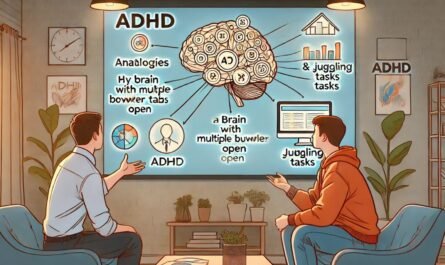What is the Mental Acuity Definition?
The term “mental acuity” refers to the sharpness or keenness of one’s mental faculties. In layman’s terms, it involves the ability to think clearly, focus, and make quick decisions. Understanding the mental acuity definition is crucial for assessing cognitive performance, including factors like memory, attention, and problem-solving skills. It is often tested and measured using various cognitive assessments, which can be valuable for diagnosing disorders or assessing the impact of certain treatments.
While mental acuity often overlaps with the term “mental acumen,” the latter tends to encompass not just quickness but also depth and complexity of understanding. A decline in mental acuity can lead to reduced mental acuity, manifesting as sluggish thinking, slower decision-making, and difficulty in focusing or retaining information. On the flip side, enhanced mental acuity can result in quicker information processing, better decision-making, and increased ability to solve complex problems.
Having a high level of mental acuity is critical in various aspects of life, from excelling in academic and professional settings to maintaining emotional well-being. It’s important to note that mental acuity can be influenced by various factors such as age, health conditions, stress levels, and lifestyle choices. Understanding this concept can offer insights into how to improve mental acuity and maintain a healthy brain function.
- The term “mental acuity” refers to sharpness in mental faculties like focus, quick decision-making, and clarity in thought.
- The concept overlaps with “mental acumen,” which includes depth and complexity in understanding.
- Decline and enhancement in mental acuity can have significant impacts on cognitive and emotional aspects of life.
How Does Mental Acuity Differ From Intelligence?
Mental acuity and intelligence are often used interchangeably, but they are distinct concepts. Intelligence generally refers to the ability to acquire and apply knowledge, reason effectively, and solve problems. In contrast, mental acuity focuses on the speed and accuracy of cognitive processes, such as how quickly one can make decisions or process information. It is also more susceptible to short-term fluctuations based on factors like stress, sleep, and health conditions.
Intelligence, often gauged through IQ tests, provides a more stable metric that remains relatively consistent throughout an individual’s life. Mental acuity, however, can vary significantly over shorter periods. For example, a person may display reduced mental acuity when they are going through emotional pain, affecting their ability to think clearly and make decisions (In Emotional Pain: A Comprehensive Guide to Understanding and Alleviating It).
In sum, while intelligence is a broader term encompassing the ability to reason, learn, and solve problems, mental acuity hones in on the speed and sharpness of these cognitive functions. It’s a more dynamic attribute that can be influenced by a range of factors, both internal and external.
- Mental acuity focuses on speed and accuracy in cognitive functions.
- Intelligence is broader and is often measured through IQ tests.
- Mental acuity can vary significantly due to stress, emotional state, or health conditions.
Can Emotional States Affect Mental Acuity?
Absolutely, emotional states can have a significant impact on mental acuity. For example, stress and anxiety can hamper focus and quick decision-making. If you’re experiencing a panic attack or an anxiety attack, you may find it incredibly difficult to think clearly (The Difference Between Panic Attacks and Anxiety Attacks: Unraveling the Mystery).
Emotions are not merely mental states; they can affect neurotransmitter levels, hormone balances, and overall brain function, thereby influencing mental acuity. For instance, the complexity of emotions you may experience when you’re deciding to break up a friendship could reduce your mental acuity temporarily (Break Up A Friendship: Navigating The Complex Terrain).
Understanding how emotional states affect mental acuity is vital for both self-awareness and emotional intelligence. By recognizing the signs of reduced mental acuity due to emotional disturbances, individuals can take steps to improve their emotional well-being, which in turn can increase mental acuity.
- Emotional states like stress and anxiety can significantly impact mental acuity.
- Neurotransmitter levels and hormone balances can be affected by emotions, further affecting mental acuity.
- Recognizing these changes can help individuals take steps to improve emotional well-being and mental acuity.
What Are Some Ways to Improve Mental Acuity?
Improving mental acuity involves a combination of lifestyle changes, mental exercises, and sometimes, medical interventions. A balanced diet rich in nutrients like Omega-3 fatty acids can positively affect brain health and thus improve mental acuity. Exercise is another critical factor; regular physical activity has been shown to improve cognitive function and mental sharpness.
In addition to physical exercise, mental exercises can help. Activities like solving puzzles, engaging in strategic games, and practicing mindfulness can sharpen the mind. Cognitive behavioral therapy and other forms of psychotherapy can also be beneficial, especially if reduced mental acuity is linked to emotional or psychological issues.
If you’re looking for a more structured approach to improving mental acuity, you might consider studying theories that focus on cognitive and emotional development, like Kohlberg’s Theory of Moral Development (Kohlberg’s Theory of Moral Development) or theories of attachment (Unraveling the Theories of Attachment). Understanding how the brain develops and attaches meaning to experiences can offer insights into ways to improve mental acuity.
- A balanced diet and regular exercise can significantly improve mental acuity.
- Mental exercises, puzzles, and strategic games can also help in enhancing cognitive sharpness.
- Theoretical study can provide a structured approach to understand and improve mental acuity.
Does Age Affect Mental Acuity?
Age does have an effect on mental acuity. It is common for cognitive processes to slow down as one ages, leading to slower decision-making, reduced focus, and challenges with multitasking. However, this doesn’t mean that older individuals are less intelligent or capable; it merely signifies a change in the rate at which information is processed.
Interestingly, while younger individuals often have quicker cognitive processes, older people usually make up for reduced mental acuity with experience and wisdom. In many cases, the application of this wisdom can lead to better decision-making than mere speed in cognitive processes.
It’s also worth noting that while aging does impact mental acuity, various activities and treatments can slow down or even reverse some of these effects. Engaging in mental and physical exercise, eating a healthy diet, and staying socially active can all contribute to maintaining or even increasing mental acuity as one ages.
- Age can affect the speed of cognitive processes, leading to reduced mental acuity.
- Older individuals often compensate for this with increased wisdom and experience.
- Various activities and lifestyle choices can help maintain or improve mental acuity in older adults.
Can Mental Acuity be Measured?
Mental acuity can be measured using various cognitive tests that assess functions like memory, attention, and decision-making speed. These tests often include tasks that require quick thinking, pattern recognition, and logical reasoning. However, it’s crucial to remember that these tests provide a snapshot of one’s cognitive abilities at that moment and can be influenced by numerous factors like stress, lack of sleep, or even diet.
Psychologists and healthcare providers often use these assessments as part of a broader diagnostic toolset, especially when evaluating cognitive decline or disorders that affect mental acuity. However, a single test should not be taken as a definitive measure of one’s mental sharpness or acumen.
It’s also worth noting that while these tests can measure aspects of mental acuity, they can’t capture the full picture. Mental acuity is influenced by a range of factors including emotional well-being, psychological state, and even the current stage of grief one might be experiencing (What is the Bargaining in Grief Stage?).
- Various cognitive tests can measure aspects of mental acuity.
- These tests provide a snapshot and can be influenced by numerous factors.
- A single test should not be considered a definitive measure of one’s mental acuity.
What Are Common Myths About Mental Acuity?
Many people harbor misconceptions about mental acuity, such as the notion that it’s synonymous with intelligence or that it remains static throughout one’s life. These myths often stem from a lack of understanding or generalizations that don’t take into account the complexity of human cognition. For example, some may believe that high intelligence automatically implies high mental acuity, but intelligence often encompasses more facets such as creativity, wisdom, and emotional intelligence.
Similarly, another common myth is that mental acuity declines inevitably with age and there’s nothing one can do to stop it. As discussed earlier, while aging has an impact, various activities and lifestyle choices can help maintain or even improve mental acuity as one ages. Another misconception is that medications can easily and safely enhance mental acuity, often leading people towards unregulated “brain-boosting” supplements that may have little to no scientific backing.
Lastly, the idea that mental acuity can be “trained” in a few quick sessions, like a muscle, is another myth. Although it’s true that certain exercises can help improve mental acuity, lasting improvement usually requires sustained effort and a comprehensive approach to mental and physical well-being.
- Myths about mental acuity include its equation with intelligence and its inevitable decline with age.
- Medications and quick fixes are often wrongly seen as easy solutions for improving mental acuity.
- Lasting improvement in mental acuity usually requires a comprehensive and sustained approach.
How Does Nutrition Affect Mental Acuity?
The role of nutrition in mental acuity is often overlooked but is crucial. A balanced diet rich in essential nutrients like omega-3 fatty acids, antioxidants, and B-vitamins can have a notable impact on cognitive function. These nutrients contribute to brain health by improving blood flow, reducing inflammation, and supporting the growth and repair of brain cells.
Processed foods high in sugar and saturated fats, on the other hand, can adversely affect brain function. Consuming such foods can lead to a feeling of mental “fogginess” and reduced mental acuity. This has been corroborated by multiple studies that show a link between poor diet and cognitive decline.
Moreover, the timing and composition of meals can also affect mental acuity. Skipping meals or eating foods high in sugar can lead to blood sugar spikes and drops, which can affect cognitive function. Therefore, a balanced diet that focuses on whole, nutrient-rich foods can go a long way in maintaining and even improving mental acuity.
- Nutrition plays a crucial role in mental acuity, with nutrients like omega-3 fatty acids and antioxidants being beneficial.
- Processed foods high in sugar and saturated fats can negatively impact mental acuity.
- Meal timing and composition also play a role in maintaining mental sharpness.
Can Mental Acuity Be Genetically Influenced?
Genetic factors do play a role in determining one’s baseline mental acuity, but it’s essential to remember that genetics is only a part of the equation. Some genetic markers are associated with faster cognitive processing or better memory retention, but these traits are also significantly influenced by environmental factors like education, lifestyle, and even socioeconomic status.
Research in the field of epigenetics has shown that while genetic factors can influence cognitive abilities, these genes can be “switched on or off” based on lifestyle choices and environmental influences. In other words, you’re not necessarily locked into a predetermined level of mental acuity because of your genetics.
This underlines the importance of a multifaceted approach to improving and maintaining mental acuity. While you may not have control over your genetic makeup, you have a significant degree of control over other factors like diet, exercise, and mental training, all of which can influence your level of mental acuity.
- Genetics play a role in determining baseline mental acuity, but it’s not the only factor.
- Epigenetic research indicates that genes related to cognitive abilities can be influenced by lifestyle and environment.
- A comprehensive approach that includes diet, exercise, and mental training can help improve mental acuity irrespective of genetic factors.
Summary Table
| Key Points | Details |
|---|---|
| Definition | Mental acuity refers to the sharpness or keenness of one’s mental faculties, including the ability to think clearly, focus, and make quick decisions. |
| Difference from Intelligence | While intelligence refers to the broader ability to acquire knowledge and solve problems, mental acuity focuses on the speed and sharpness of cognitive processes. |
| Emotional Impact | Emotional states can significantly affect mental acuity, influencing speed and clarity of thought. |
| Ways to Improve | Lifestyle changes, mental exercises, and medical interventions can contribute to enhanced mental acuity. |
| Age Factor | Mental acuity often declines with age, although lifestyle choices and activities can mitigate this effect. |
| Measurability | Various cognitive tests can measure aspects of mental acuity, but they should not be taken as definitive. |
FAQ Section
What is the mental acuity definition?
Mental acuity refers to the sharpness or keenness of one’s mental faculties, including the ability to think clearly, focus, and make quick decisions.
How does mental acuity differ from intelligence?
Mental acuity focuses on the speed and sharpness of cognitive processes, while intelligence encompasses a broader ability to acquire knowledge and solve problems.
Can emotional states affect mental acuity?
Yes, emotional states can significantly impact the speed and clarity of one’s cognitive processes.
What are some ways to improve mental acuity?
Improving mental acuity can involve a balanced diet, mental exercises, and making lifestyle changes like getting sufficient sleep and exercise.
Does age affect mental acuity?
While mental acuity often declines with age, various lifestyle choices and activities can mitigate this effect.
Can mental acuity be measured?
Yes, various cognitive tests can provide a snapshot of one’s mental acuity, although they should not be considered definitive measures.
What are common myths about mental acuity?
Common myths include its equation with intelligence and the belief that it cannot be improved.
How does nutrition affect mental acuity?
A balanced diet rich in essential nutrients like omega-3 fatty acids and antioxidants can positively impact mental acuity.
Can mental acuity be genetically influenced?
While genetic factors can influence baseline mental acuity, lifestyle choices and environmental factors can also play a significant role.
Is mental acuity static or can it be improved?
Mental acuity is not static and can be improved through a combination of lifestyle choices, mental exercises, and sometimes medical intervention.


